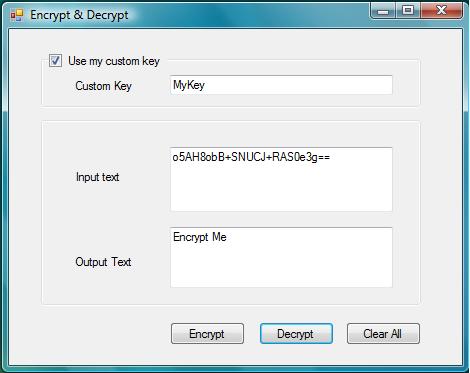Java Code To Encrypt And Decrypt A String Using Rsa
Popular Post • There are many ways to encrypt and decrypt. 0 comments 16 views • What is properties file? Properties files. 0 comments 13 views • In many android apps we have seen sliding i. 0 comments 13 views • Live Demo Follow the below steps to co.
0 comments 6 views • Reading a properties file in java is common, same way w. 0 comments 6 views • Hi Friends hope everyone knows autocomplete in jquery. 0 comments 5 views • Apache POI is the api to create and modify. 0 comments 4 views • How to Encrypt Decrypt File in Java? 0 comments 4 views • Sometimes we need ‘Accordion Menu ‘ in our project. 0 comments 4 views • How to setup android studio for android devel.


0 comments 2 views.
The last few lines of your Java decrypt code do not make sense. These lines are: byte[] base64String = Base64.decode(encodedString); byte[] plainBytes = new String(base64String).getBytes('UTF-8'); byte[] cipherData = cipher.doFinal(plainBytes); System.out.println(cipherData); return cipherData.toString(); You have to reverse the order of the steps you used to encrypt in.NET. First, you should Base64 decode the encoded string to get the cipher bytes. You did that, but you mislabeled the result as base64String. You probably should call this result cipherData. Second, you need to decrypt cipherData to get plain text. Third, you should create a string from plainbytes using the two-arg String constructor with the Charset for the second argument.
Let's Break down tasks which helps us to encrypt and decrypt data using RSA. Java Program - RSA Public Key Encryption and. You using above code like.
Here is what the code should look like, or close to it. Byte[] cipherData = Base64.decode(encodedString); byte[] plainBytes = cipher.doFinal(cipherData); return new String(plainBytes, 'UTF-8'); Finally, in Java every object has a toString() method but it doesn't always do what you want.
For arrays the toString() method simply returns a representation of object id for that array, sort of the JVM equivalent of a memory address. EDIT: I missed that you are also using the wrong key in your decrypt code. Your are using the RSA public key, but you must instead use the RSA private key. I'm doing something very similar but as a result of decrypt, I'm getting a Null input buffer: java.lang.IllegalArgumentException: Null input buffer somewhere in the code. Criss Angel Book Pdf more. I printed out my private key and it seems to be something like this: Sun RSA private key, 1024 bits modulus: 994079227 private exponent: 121242481 I took out parts of it because it was too long. Any idea why this is happening – Mar 27 '13 at 22:54 •.
Here is the answer I couldn't post yesterday, related to the first answer to my post. Well, I have tested the code and I have some problems.
I have tried not to change anything unless it was completely necessary. First I get an error here: Cipher rsaCipher = Cipher.getInstance(RSA_ALGORITHM, CRYPTO_PROVIDER); The 'Entrust' crypto provider is not recognized. So I left just the first parameter. Then I get this error: javax.crypto.BadPaddingException: Data must start with zero I have tried through a WebService written in.NET which returns always byte arrays.
Maybe there is some kind of problem in the translation. I know that I have to use Base64 numbers and (if I don't use AES) I have to break my Strings into pieces with the size of 128 bytes (limited by the RSA key). I am still working on the problem to realize why I could encrypt in Java and decrypt in.NET but not the opposite.
Thanks again for your help!!